#brigante
Text
Maria Oliverio, la brigante Ciccilla
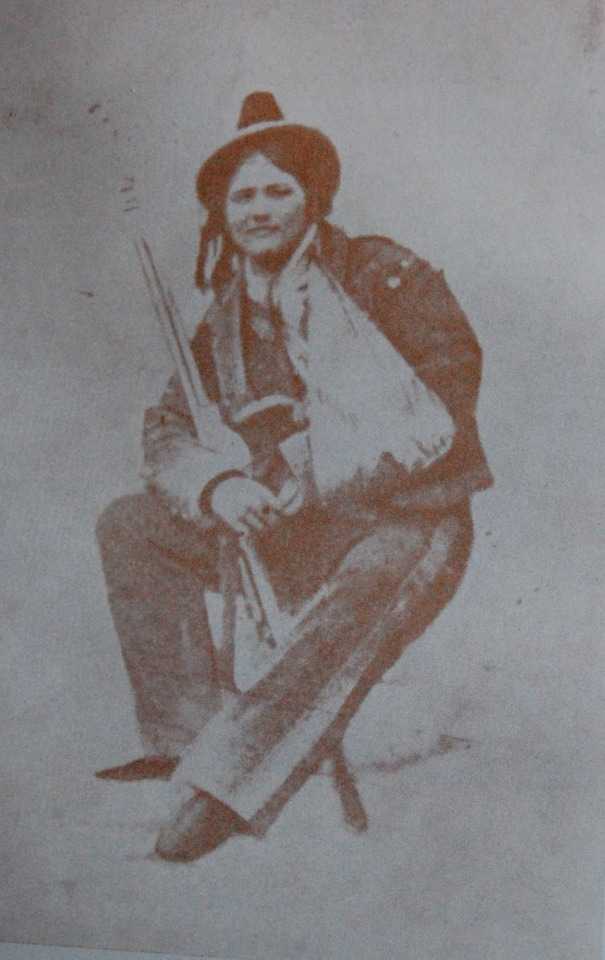
Maria Oliverio è stata una donna dedita al brigantaggio in Calabria dopo la proclamazione del Regno d’Italia di Vittorio Emanuele II.
Il nome di battaglia, Ciccilla, era stato scelto in disprezzo di Francesco II delle Due Sicilie, chiamato dal popolo, Franceschiello.
Nacque il 30 agosto 1841 a Casole Bruzio, in provincia di Cosenza, e da giovanissima svolse l’attività di filatrice. Donna libera e ribelle, abituata a cavarsela da sola, ha sempre seguito il suo istinto e le sue ragioni.
Nel 1858, all’età di 17 anni, sposò Pietro Monaco, prima soldato dell’esercito meridionale, poi volontario garibaldino, deluso dalle mancate promesse divenne disertore e si trasformò in uno dei più abili e feroci briganti della storia.
Nel marzo 1862, per costringere il marito a costituirsi, venne arrestata da Pietro Fumel mandato in Calabria per reprimere il brigantaggio, famoso per le torture, le esecuzioni pubbliche, lo scempio dei cadaveri decapitati e impalati nelle pubbliche piazze.
Mentre era in carcere le era arrivata voce che sua sorella Teresa era l’amante di suo marito, appena uscita, andò da lei e la uccise nel sonno con numerosi colpi d’accetta, davanti ai nipoti.
Per sfuggire al corso della giustizia, si unì alla banda dei briganti del marito nella Sila e, abile nel tiro e audace nell’azione, scalò presto le gerarchie di comando.
Durante i pochi anni passati a combattere si è resa protagonista di due imprese clamorose: il sequestro di nove persone a Acri il 31 agosto 1863 e il rapimento di due cugini che fruttò alla banda la cifra record per i tempi di 20.000 ducati.
La banda di cui ha fatto parte, composta da una quarantina di elementi, compì furti, violenze, incendi e omicidi.
Il 24 dicembre 1863, suo marito venne ucciso a tradimento durante il sonno. Lei, rimasta ferita al polso durante la sparatoria, prese il comando della banda e tenne in scacco l’esercito del re per quasi due mesi. Rifugiata in una grotta nella Sila, aveva vissuto come una lupa, cacciando da sola gli animali da mangiare, scaldandosi con un piccolo fuoco, rintanata per non farsi scoprire. Venne catturata, perché tradita dai contadini del luogo. Dopo uno scontro a fuoco in cui rimase asserragliata per un giorno intero, dovette soccombere al nemico che all’inizio, l’aveva scambiata per un uomo.
Il processo, che la vide imputata per trentadue capi d’accusa, si tenne a Catanzaro davanti al Tribunale di Guerra il 16 febbraio 1864, aveva ventidue anni.
Scritture del tempo citano: “Si fa noto che si è qui presentata vestita da uomo indossando gilè di panno a colore, giacca e pantaloni di panno nero e il capo avvolto in un fazzoletto.”
Si era dichiarata illetterata mentre, in realtà, sapeva leggere e scrivere, aveva fatto le scuole elementari e rubato i libri al marito per indottrinarsi, ma aveva preferito farsi passare come una tessitrice ignorante davanti alla legge. Così come andava in giro vestita da uomo perché era l’unico modo per sentirsi libera e avere il comando di una pattuglia.
Dei vari reati di cui era accusata negò tutto tranne l’assassinio di sua sorella, sostenendo che agli altri omicidi ed atti delittuosi era stata costretta.
La condanna fu esemplare, è stata l’unica donna coinvolta nel brigantaggio condannata a morte, sentenza poi commutata in carcere a vita da Vittorio Emanuele II. Venne rinchiusa nella fortezza di Fenestrelle a Torino, tristemente famosa come luogo di pena di tanti combattenti ed ex soldati borbonici.
È morta, verosimilmente, dopo 15 anni, nel 1879, ma non esistono documentazioni certe che ci possano far risalire alla successiva storia della sua vita o ai dati relativi alla sua data di morte o luogo di sepoltura.
La figura di Ciccilla ha affascinato lo scrittore Alexandre Dumas che, sul suo giornale L’Indipendente, scrisse un racconto sulle sue gesta e quelle del marito dal titolo Pietro Monaco sua moglie Maria Oliverio e i loro complici.
La sua storia viene citata in diversi libri sul brigantaggio che la descrivono come abile stratega, avvezza a una vita di fatica, che sapeva usare bene le armi, terribile coi traditori, combattiva con i soldati piemontesi ma mite con gli ostaggi e le persone innocenti. Perfettamente integrata nella banda, godeva dell’assoluta fiducia del compagno e sovente ne faceva le veci.
La sua vita è stata recentemente raccontata nel romanzo Italiana di Giuseppe Catozzella del 2021 e ha ispirato il film Brutta Cera di Andrea Bonanno, del 2019.
1 note
·
View note
Text

Brigantessa
1 note
·
View note
Text
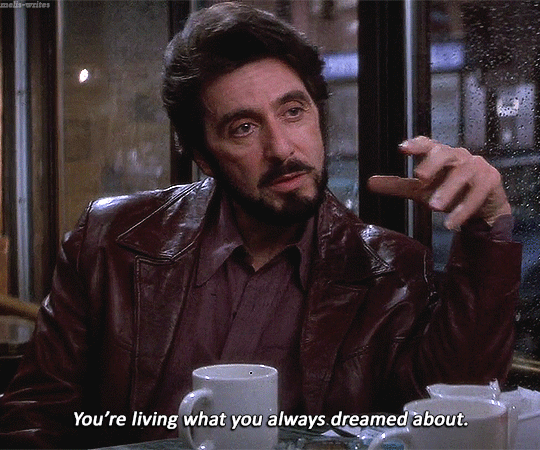
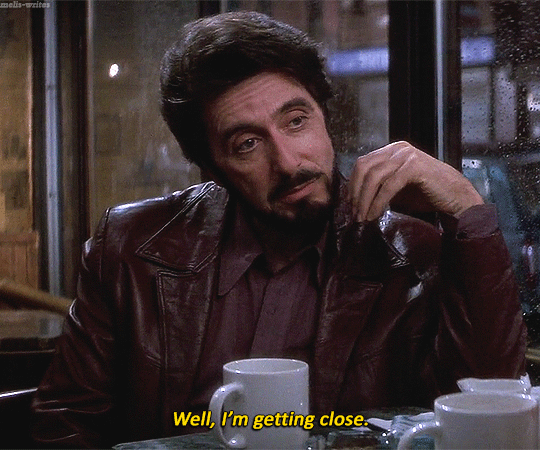

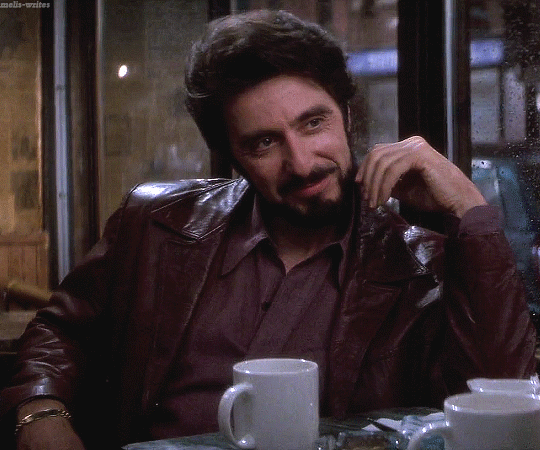
CARLITO’S WAY (1993) | dir. Brian De Palma.
#melisgifs#moviegifs#movieedit#dailyflicks#film#movies#entertainblr#filmedit#filmgifs#filmtv#fyeahmovies#tvandfilmdaily#tvandfilmgifs#cinemapix#cinematv#carlito's way#carlito brigante#al pacino#alfredo james pacino#brian de palma#1990s#90s#Penelope Ann Miller
217 notes
·
View notes
Text
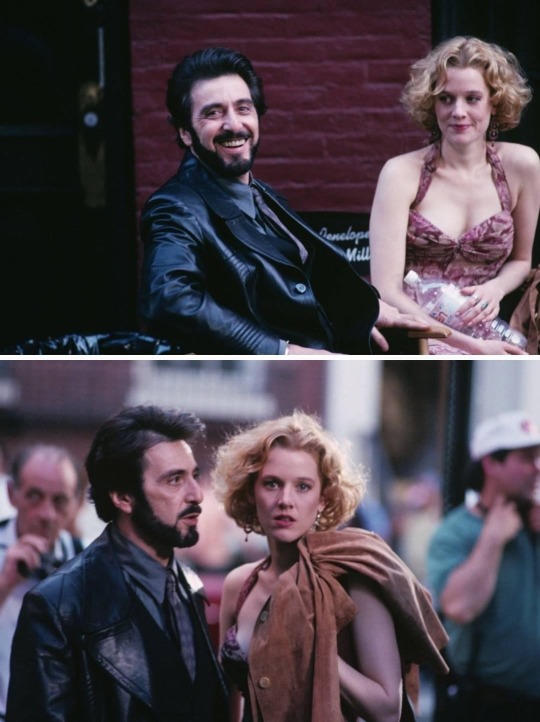
#filme#filmes#film#movie#movies#cinema#o pagamento final#carlito’s way#al pacino#carlito brigante#gail#penelope ann miller
45 notes
·
View notes
Text
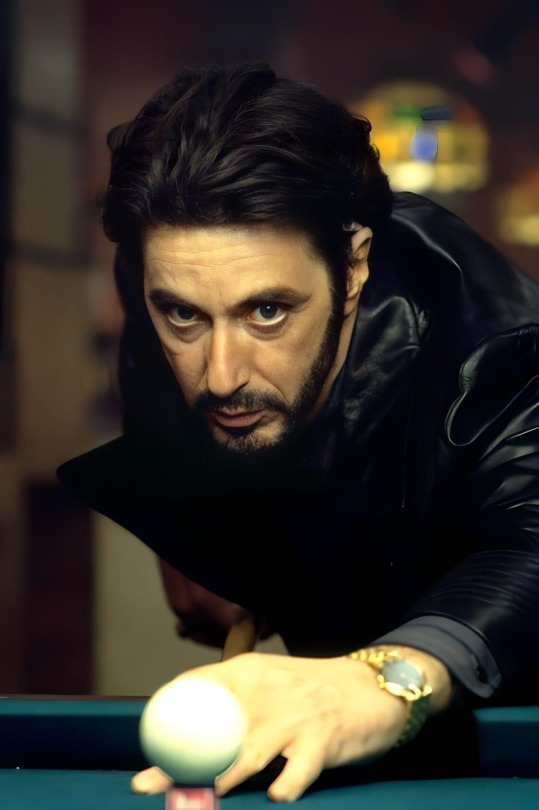
#al pacino#alfredo james pacino#alpacino#pacino#al#ap#carlito’s way#o pagamento final#carlito brigante
22 notes
·
View notes
Text

Jules-François Crahay for Nina Ricci Haute Couture Spring/Summer 1962 Collection. Tilly Tizzani in a yellow wool coat belted with black. Hat by Jacques Le Brigant. Slingback pumps, by Charles Jourdan. (Queen Magazine, February 27, 1962)
Jules-François Crahay pour Nina Ricci Collection Haute Couture Printemps/Été 1962. Tilly Tizzani en manteau de laine jaune ceinturé de noir. Chapeau de Jacques Le Brigant. Escarpins à bride arrière, par Charles Jourdan. (Magazine Queen, 27 février 1962)
Photo Norman Parkinson.
#haute couture#french designer#french style#nina ricci#jules-françois crahay#tilly tizzani#charles jourdan#jacques le brigant#queen magazine#february 1962#spring/summer#printemps/été#wool coat#manteau en laine
25 notes
·
View notes
Text

'Character that I...'
al pacino edition
#al pacino#arthur kirkland#sonny wortzik#Bobby axel#frank slade#carlito brigante#john milton#Michael corleone#and justice for all#...and justice for all#dog day afternoon#panic in needle park#scent of a woman#carlito's way#the devil’s advocate#the godfather#the godfather part 2#the godfather part ii#the godfather ii
111 notes
·
View notes
Text
AL PACINO CHARACTER TOURNAMENT ROUND TWO


#apct.txt#al pacino character tournament#al pacino#carlito brigante#carlito's way#vincent hanna#heat 1995
41 notes
·
View notes
Text

“While looking for the light, you may suddenly be devoured by the darkness and find the true light.”
Jack Kerouac
8 notes
·
View notes
Text


a daily occurrence 😔😔😔
#setting the mood for this acc so y’all know what kind of silly girlie i am#anyway brian de palma you really did god’s work out there 😔😔😔#never thanking your silly ass enough#💗carlito💗#the things he could do to me fr#al pacino#brian de palma#carlito brigante#carlito's way
29 notes
·
View notes
Text

Happy birthday to absolute legend Al Pacino! 🥳🍾 He means so much to me and his movies have helped me get through some tough stuff. Here’s to another wonderful year and more wonderful movies!
#Al pacino#alfredo james pacino#70s film#Hollywood#Scarface#the godfather#heat 1995#carlito’s way#michael corleone#tony montana#carlito brigante#80s films#90s films#actor#icon#legend
40 notes
·
View notes
Text
Italian radio host Max Brigante: I speak bad English and bad Spanish. In which language do you prefer to do this interview?
Gael García Bernal: In Portuguese…
[spoiler: they settle on a mixture of Italian and Spanish in the end]
My best (aka very shaky) attempt at a translation after the jump...
Max: [in Italian] Welcome!
Gael: [in Italian] Thank you; I’m happy to be here.
Max: [in Italian] Very good. [in English] I speak bad English and bad Spanish.
Gael: OK
Max: [in English] In which language do you prefer to do this interview?
Gael: [in English] Portuguese…
Max: [in English] Portuguese? [BOTH LAUGH]
Gael: [in Italian] We speak in Portuguese, no? Yes?
Max: [in Italian] No, then I like the sound of Spanish. [in Spanish] I like the sound of Spanish.
Gael: [in Spanish] That's great.
Max: [in Spanish] So, we’re doing this in Spanish?
Gael: In italiñol!
Max: [LAUGHING] italiñol, si… [in Italian] I said that basically I speak bad English, bad Spanish, I asked how he preferred to do the interview and, in the end, we'll do it in Spanish, but actually I was already chatting with him. Basically, the film that brings this great actor here is Another End, among other things he was supposed to come with Piero Messina, but Piero was not well and he is the director. And I was just saying, you know, that it's the most natural thing but I think also important [? Not sure if I caught that bit correctly ?]. And I was asking if you're happy with the movie you made? Do you enjoy the film, are you happy with it?"
Gael: [in Spanish] Yes, I'm happy with the film because, well, the film turned out great, but also the experience of making it was really beautiful. We had a fantastic team and it delved into a deep philosophical topic, which is death. But it also brings up this fascinating debate about how much our bodies really matter to us in death, you know? We usually think of the body as something totally disposable, but the movie throws in this interesting twist and goes like, no, it's not that simple for me.
Max: [in Italian] So Gael says yes, he really liked the film. He's very happy, very happy to have worked with a very close-knit team. And then he says the theme, the theme of the film is a philosophical theme. Usually, we tend to think about death in a certain way. Memories, and the person, the body. Does it just disappear? What do we think death is? But here there's another theme and another question, very philosophical, very interesting. The main theme is definitely death, but also love.
Gael: [in Italian] Yes, exactly. Very good translation, fantastic. [in Spanish] Yes, of course, that's where the real melodrama is, right? You need death and you need love; it's not something romantic and separate from death, also, for that romantic story to exist. The movie is about memory, about various things, but it really is a story of how love can also transcend the very concept of death, something that is missed.
Max: [in Italian] He mentioned the main theme of death. I said yes, but I got the impression that love is also a big part of it, and he said absolutely, they're both themes, and how love might even overcome death because, to put it simply, the film is about a love that's separated by death. But through this technological system – let's call it that – named ‘Another End’, there's a way to get closer again to the soul of the person who's gone, but through another body. So, the theme's pretty complex, but really interesting, because it raises a whole bunch of questions. I know actors have their own ways of preparing and getting into character, so I'm curious how it was for you to interpret these characters in this particular story?
Gael: [in Spanish] Playing this character, this particular story, my answer might sound a bit redundant, because I usually get involved through the body, which is unusual. And it's definitely my instrument, right? But I think I have to embody it in that sense. Literally, I need to incorporate the character before I can start moving and discovering many more things along the way. And also to trust in the complexity of the story, of being alive, you know, because there are other actors who approach characters in a more psychoanalytical way, maybe a bit more rationally? But for me, the truth is that it all starts with something in the body. That's where I anchor myself and hold on, sometimes it doesn't go well, but that's it.
Max: [in Italian] OK, so he said that it might sound weird, when I asked him how he worked to get into the character, since we talked earlier about adding another layer of value to bodies. Gael said “Look, it'll sound strange. I really start with the body, the physicality of the character.” And that's how he works differently. So, he starts from there. He always needs to literally get into the skin, into the body of the character, and then from there, he develops everything that the character has to do within the plot. But what's the main emotion of the film? I was thinking about this love story that’s cut off because death intervenes. But the souls remain close... And I asked, so is the main feeling a feeling of pain? Is it a nostalgic feeling? And you told me no, it's romantic, it's a beautiful thing.
Gael: [in Spanish] Yes. Anything that's considered romantic today is usually… it's gentler. It's more… it doesn't carry that significant theme of life and death, right? But historically, that wasn't the case. Romantic stuff always had an element of death as well.
Max: [in Spanish] A little tragic…
Gael: [in Spanish] Yes, tragic. Yes, completely, yes.
Max: [in Italian] Gael said, is the movie romantic in the sense of that old-school romance? No, because nowadays, we're also used to thinking, if someone says ‘a romantic movie’ that it’s kind of syrupy, it's a bit light. But that romance of the past, that old-time romance, even in literature, always encompassed both love and death as two very close elements, right? The love that brushes against death, that's what the movie revolves around. And we’re talking about feelings. I wanted to ask you, then, what do you like the most about this film that you've made, that's out today. What is it that you really enjoy about this film?
Gael: [in Spanish] I think, from the beginning, it always was, when I was doing it, it felt like we were creating something interesting, something mysterious. Then, the alchemy of putting the right pieces together makes something work. Or not, some things just can't be fixed, right. So, in that dream, in that hope, I loved working with fantastic actors and actresses, in this case, Bérénice Bejo, who is an Argentine-French actress, and Renate Reinsve, a Norwegian actress, both fantastic, incredible. And honestly, we had a really beautiful rapport, we had a great time, enjoyed ourselves a lot, and amidst all the tragedy, there was a lot of light too. We laughed a lot behind the scenes. I mean, there was a lot of comedy in what we were doing, too.
Max: [in Italian] I asked him, what did you enjoy the most about the film? He said, well, obviously the theme, the story and then the hope that the editing would bring everything together in the best way. The theme isn't exactly simple, but then working with fantastic actors and having this team spirit was great. And even though the film touched on some tragic topics, there was actually a lot of comedy behind the cameras, they laughed, they had fun. The team spirit was really strong. I wanted to take advantage of Gael's presence to ask a question I always ask actors who also have experience as directors. I like to ask this question and want to know what's the main difference, right, between being in front of or behind the camera. There are many differences, but I'd like to know in your opinion what the main difference is?
Gael: [in Spanish] To begin with, I'll say this, it's not just one thing, there are several things. One immediate thing is, as a director – you know, moving from acting to directing – the first thing you feel is this tremendous loneliness and isolation.
Max: [in Italian] Loneliness? When you go from an actor to a director, the first thing you feel, it's a great loneliness.
Gael: [in Spanish] Yes, because if the film doesn't work out, if it stops being made, if something happens, it's really only the person directing who feels terrible, the only one who's going to have insomnia for two months, who's going to therapy and everything. Because for actors, sure, they care, but it passes quickly, right? That's a major one, but I'll say that what you also discover as a director is that films are like a Frankenstein, that's why it's called 'editing' [NOTE: this reference doesn’t translate easily into English; in Spanish montaje, the word Gael uses here, has a dual meaning – it refers to 'editing' in the context of film but 'assembly' in a manufacturing/engineering context], because it was engineers who made the first films. Because there's some kind of magic in editing, in juxtaposing one image with another, with another, with music, and with this and that, and gradually it turns into something that slips out of your hands as an actor. Directing for the first time, I said “Ah, no, I have no idea, I mean, I really don't control anything, right?”
Max: [in Italian] Well, first off, I'll remember 'loneliness' as an answer. He says it’s because the director needs therapy, can't sleep for two months, but it's just him, because the others, sure, they care, but then? Well, they sleep, but the director doesn't. And then he says, as a director, he discovered that a film is really a Frankenstein, meaning you have to assemble it, that's why we talk about 'editing' [NOTE: the reference works in Italian as well] and why engineers were the first to edit films. It's really a whole world: you have to put all the little pieces together, the music, everything. It's obviously a completely different kind of work. I'm really glad to have had this chat with you, Gael, thank you for being here.
Gael: [in Italian] Thank you.
Max: [in Italian] Let's remind everyone that 'Another End', the film you're starring in, directed by Piero Messina, who couldn't be here tonight, is out in theaters, so we invite you to go see it. Thanks, goodbye, and good luck with everything. Ciao!
6 notes
·
View notes
Text
Amadeus ai Tim (o Seat a seconda dello sponsor) Music Awards ogni anno proprio andando a fare la spesa per Sanremo
7 notes
·
View notes
Text

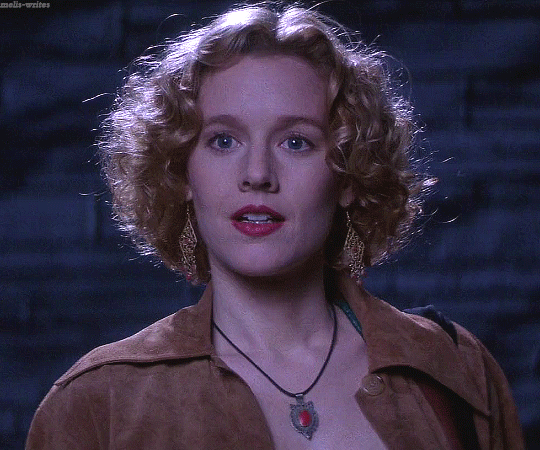

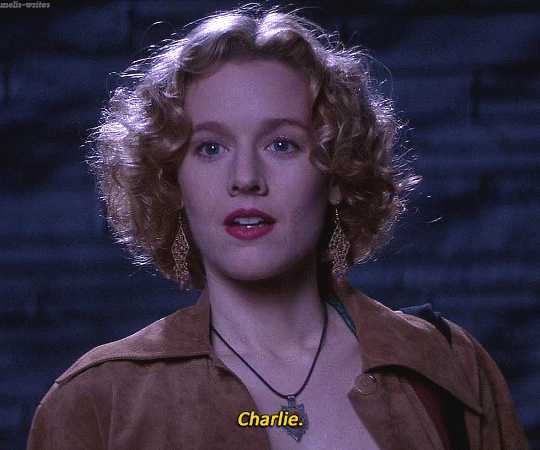
CARLITO’S WAY (1993) | dir. Brian De Palma.
#melisgifs#moviegifs#movieedit#dailyflicks#film#movies#entertainblr#filmedit#filmgifs#filmtv#fyeahmovies#tvandfilmdaily#tvandfilmgifs#cinemapix#cinematv#carlito's way#carlito brigante#al pacino#alfredo james pacino#brian de palma#1990s#90s#Penelope Ann Miller
160 notes
·
View notes
Text
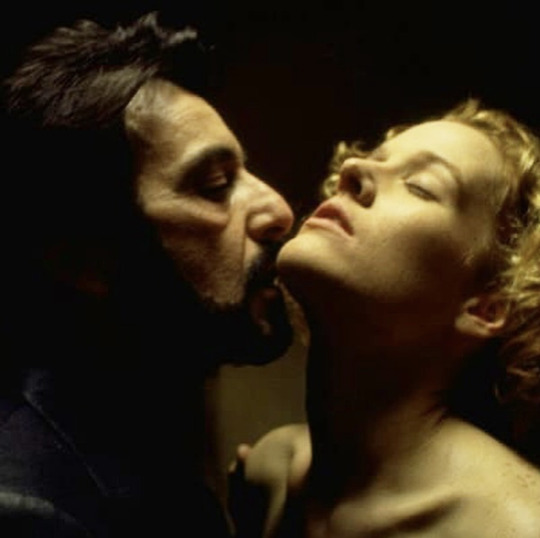
#filme#filmes#film#movie#movies#cinema#carlito’s way#o pagamento final#carlito brigante#al pacino#gail#penelope ann miller
33 notes
·
View notes
Text

16 notes
·
View notes